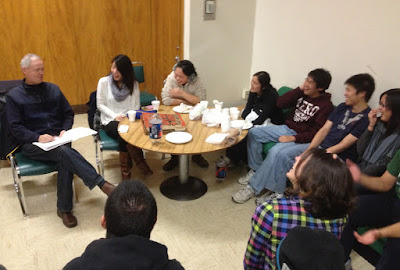
In my travels to campuses around the country (40 in the past two years), I meet up with a lot of students who are headed to grad school someday. Here is what I wish I could suggest to each one of them:
Begin with the end in mind.
The “end” is the final goal, the destination of one’s schooling. For many students, that would be to get a good job in their field and make a significant contribution to the overall good of humanity. Not bad! But in my view, for the Christian it’s shooting too low. Let me suggest a goal that is more lofty than making a living and doing good – that, in fact, will encompass these lesser goals into a higher calling. I believe the ultimate goal of an education is to develop into a person. Period.
Biblical Personhood
Not what you expected me to say, perhaps. But when I think of the idea of personhood in the biblical sense, I’m thinking of the grandest vision possible for one’s life. To become a person is to develop most fully into the image of God. That is, to become “like” God. I’m thinking here of a rich, multi-faceted anthropology that begins in the book of Genesis and extends throughout the scriptures. Personhood is rooted in the eternal love relations of the Trinitarian God. Created male and female, human beings are meant to “image” God in community, work, rest and play. The first humans were placed in a garden where their charge was to rule over the world and to “be fruitful, multiply and fill the earth” (Gen 1:28). Even after the Fall, our original parents were to work the land, engage in human relations (now disordered) and procreate. Jesus represents the fullness of God’s image. So if we want to know what God is really like, we will look to Jesus (Heb 1:3), and if we want to become “like God,” we will learn to know Jesus and become like him.
These brief comments on image-of-God theology will have to suffice for this blog format. But if you study the topic further, I think you’ll discover that “image of God” provides massive conceptual space for thinking through your entire education. Here is my attempt at summarizing the intersection of personhood (image of God) and schooling: Every facet of my education should serve to develop me more fully into the image of God.

Secular Learning
If everything that I study supposedly moves me along the path toward the fullness of God in my life, what do I do with secular learning – with academic work that doesn’t harmonize with biblical teaching? Here is where it gets dicey, and I must choose my words carefully. I believe the calling of the Christian academic is to respectfully and critically interact with ideas that are foreign to a biblical worldview. Notice the two adverbs – respectfully and critically. I believe it’s a sign of maturity to show love and respect to those with whom we disagree. Jesus even took it a step further. He commanded us to actually love our enemies. Most nonChristian professors and text books we interact with are not “enemies” of the gospel per se, though a few might be. In any case, show them love and respect, which are winsome expressions of Christian character.
But don’t be uncritical. There is no requirement, scripturally speaking, to just take in any and all ideas without evaluating them. On the contrary, we are warned often in the Bible about the dangers of worldly knowledge and wisdom (e.g., 1 Cor 2:5, Col 2:4,8). So, filters up, but not shields. That is, use the Bible as a filter to sift through secular knowledge. Keep what is true, discard the rest. In either case, the process of evaluating secular knowledge is a virtuous practice for the Christian. You will grow further into God’s image by learning to discern truth from error. It’s called wisdom!

But how different this sifting of knowledge is than the knee-jerk reaction of some Christians to simply “raise shields,” like a starship protecting itself from enemy fire. Raising shields is usually a sign of fear and defensiveness, not wisdom and discernment. In his fine book, Mind Your Faith, David Horner notes, “Christians need not fear ideas that come from outside a Christian worldview. God’s truth can be discovered throughout the created order and within all the academic disciplines. We need to be discerning however, because not all truth claims are true” (p135).
In my next post, I’ll suggest some practical ways to move toward this ideal of biblical personhood (the fullness of the image of God). And in the third post I’d like us to learn to think missionally while studying in the academy.
- For a helpful summary of theological models of the image of God, see Millard Erickson, Christian Theology(Baker, 1985), 495-517.
“The Social God and the Relational Self” by Stanley Grenz. Westminster John Knox Press, 2001. - For a developmental model of the image of God, see Stanley Grenz, The Social God and the Relational Self (Westminster John Knox Press, 2001), 177-181. Note that this is a pretty technical read.
- For excellent suggestions on how to flourish as a Christian student in the secular academic world, see David Horner, Mind Your Faith (InterVarsity, 2011), especially Chapter 7.
Rick Mattson is a national evangelist and apologist for InterVarsity, speaking at over eighty campuses the past few years. He lives in St. Paul, MN with his family. He studied at Bethel Seminary of St. Paul, MN, where he received his masters in the philosophy of religion. As part of his current duties he serves as evangelism coach for graduate students at several universities. Rick’s a committed family man and serious golfer. He is the author of three books: Faith is Like Skydiving, Faith Unexpected and Witness in the Academy.

Leave a Reply